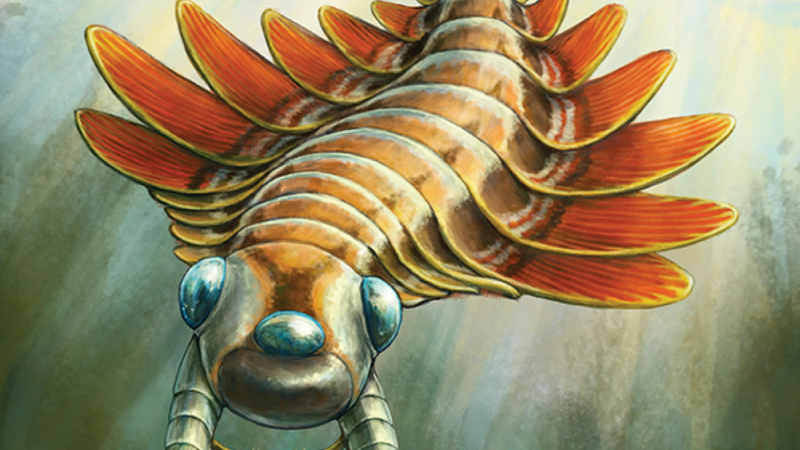Paleontologists discover a 500-million-year-old, 3-eyed predator
Paleontologists have discovered a three-eyed creature with a pencil sharpener-like mouth that roamed the sea for prey more than 500 million years ago.
The fossilized remains of one Mosura fentoni — nicknamed the “sea moth” — were found in the Burgess Shale of Canadian Rockies, presenting researchers with new insight into animal life in the Cambrian period, according to a paper published this week in the journal Royal Society Open Science.
The predator was about the length of an index finger, with three eyes dotting its head and a circular mouth lined with teeth, according to paleontologists at the Manitoba Museum and Royal Ontario Museum who made the discovery. The beast was also equipped with flaps on both sides of its body for swimming, and had intimidating claws extending from its head.
“It has a pair of these jointed claws at the front of its head that have these very long spines on them,” said lead study author Joe Moysiuk, curator of paleontology and geology at the Manitoba Museum.
“It gives it almost a bit of an Edward Scissorhands look.”
The discovery of the Mosura — part of the extinct group, radiodonts — revealed that the creature was much more complex than fossils of other radiodonts previously suggested, according to researchers.
Rather than the simple abdomen-like area observed in other radiodonts, at its rear, this creature’s body included 16 segments lined with gills, similar to modern arthropods.
“One of the really interesting things about this discovery is that multi-segmented abdomen-like region of the body of this new species, and it’s something that we haven’t seen in any of its close relatives before,” Moysiuk said. “It shows us that these animals were capable of modifying different regions of their body and specializing them for different sorts of functions, which is something that we see in a lot of the living relatives.”
The well-preserved fossil showed the Mosura’s open circulatory system, consisting of a heart that pumped blood into large body cavities, called lacunae.
The sea moth is believed to have used its body flaps to swim similarly to modern stingrays, sharing the waters with fellow radiodont and early apex predator, the iconic Anomalocaris canadensis.
Stewart Edie, a paleobiologist at the Smithsonian Museum of Natural History, said the discovery of the Mosura gives scientists better insight into how diverse life on Earth was even prior to the Cambrian explosion — during which complex life began to take shape.
“The Cambrian Explosion is famous for setting up the foundational body plans for most of the major animal groups we know today — but less clear has been how quickly or extensively evolution was proceeding within them,” Edie said.
“The recent discovery of Mosura shows that a group of arthropods — one long-held to be rather pedestrian in its evolutionary history compared to its close relatives — was in on the ‘explosion,’ too.”
U.S. unexpectedly adds 130,000 jobs in January after a weak 2025
U.S. employers added 130,000 jobs in January as the unemployment rate dipped to 4.3% from 4.4% in December. Annual revisions show that job growth last year was far weaker than initially reported.
Greetings from Mexico City’s iconic boulevard, where a dog on a bike steals the show
Every week, more than 100,000 people ride bikes, skates and rollerblades past some of the best-known parts of Mexico's capital. And sometimes their dogs join them too.
February may be short on days — but it boasts a long list of new books
The shortest month of the year is packed with highly anticipated new releases, including books from Michael Pollan, Tayari Jones and the late Nobel laureate Mario Vargas Llosa.
Shootings at school and home in British Columbia, Canada, leave 10 dead
A shooting at a school in British Columbia left seven people dead, while two more were found dead at a nearby home, authorities said. A woman who police believe to be the shooter also was killed.
Trump’s EPA plans to end a key climate pollution regulation
The Environmental Protection Agency is eliminating a Clean Air Act finding from 2009 that is the basis for much of the federal government's actions to rein in climate change.
The U.S. claims China is conducting secret nuclear tests. Here’s what that means
The allegations were leveled by U.S. officials late last week. Arms control experts worry that norms against nuclear testing are unraveling.







